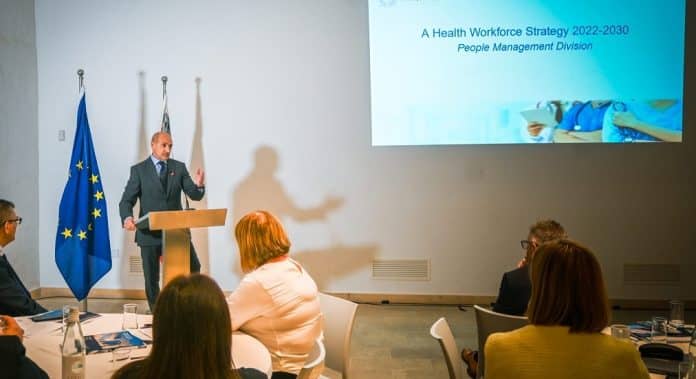In line with WHO/Europe’s recommendations, Malta has launched its first-ever national health workforce strategy, an ambitious plan to tackle the shortage of health workers while addressing gaps in their training, retention and professional development.
Nearly 7% of all health workers in Malta – and more than 11% of nurses – come from another country. The strategy therefore places an emphasis on the training of nurses, including in Maltese language skills, and the recruitment of cultural mediators to coach foreign workers.
WHO/Europe’s newly launched flagship report, “Health and care workforce in Europe: time to act” lists 10 clear actions for countries to upscale their support to, and investment in, their health workforce. The actions highlight the importance of having a national strategy such as the one just launched by Malta.
“Our recommendations also include the development of proper capacity for planning and managing the health workforce and for building robust health information systems. The good news is that Malta is already implementing all of these and more,” said Dr Natasha Azzopardi-Muscat, WHO/Europe’s Director of the Division of Country Health Policies and Systems and head of the department that oversaw the production of the report.
“One of our key findings in the report is the rapid ageing of health workers in many countries across the WHO European Region, but this is less severe in Malta than elsewhere. While in most countries, 40% of medical doctors will retire in 10 years or so, in Malta, only a little over 17% of doctors are older than 55.”
Health workers struggling with mental health
Another important finding in WHO/Europe’s report is the increased mental and emotional stress suffered by health workers, especially against the backdrop of the COVID-19 pandemic.
Higher infection rates and deaths among frontline workers, coupled with long working hours and few chances for rest and recuperation, have pushed many health workers to the brink of burnout – with far too many opting to leave the profession altogether.
Malta’s ambitious new strategy aims to tackle this by increasing counselling services to create more awareness regarding self-care, resilience and coping mechanisms.
The recruitment and retention of skilled health workers have also been major challenges in Malta, as elsewhere in the Region. The new strategy places them as top priorities, highlighting the importance of the health sector in the country’s national labour system.
“Countries with developed health-care systems are now facing a great challenge to recruit an adequate health workforce,” said Dr Chris Fearne, Malta’s Deputy Prime Minister and Minister for Health. “This international problem is as much of a global threat as a pandemic, and we must address it on an international level.”
Joint efforts for health and care workers in the Region
WHO/Europe’s new report calls on countries to rethink how they manage the production and development of their health workforce, and notes that strategic planning and sustainable investment should become the norm. WHO/Europe will continue to provide guidance and support in this area, while also bringing governments together to outline what works best.
In this collaborative spirit, experts from WHO/Europe hosted a series of workshops in Malta immediately following the unveiling of the new national strategy. One of the issues addressed was the need to think not only of health workforce numbers, but also of the skills needed and how to encourage the right changes.
“It’s through these collaborative efforts that we can understand how best to support countries moving forward, and how we can turn the data and information into concrete recommendations that place the needs of health workers first,” Dr Azzopardi-Muscat explained.
In early 2023 in Bucharest, WHO/Europe will partner with the Government of Romania to convene the first Region-wide high-level meeting on health and care workers. Aimed at renewing political commitment to investing in the health and care workforce, the meeting will be an opportunity to cement current progress and outline a region-wide strategy to protect health workers in the Region’s 53 countries.

